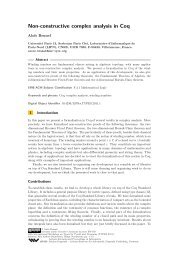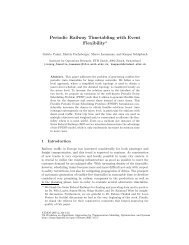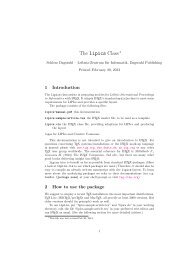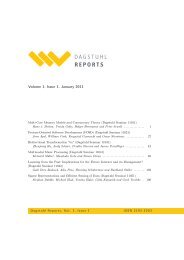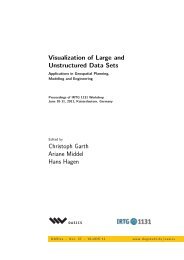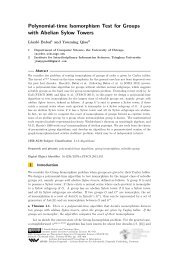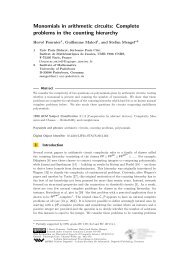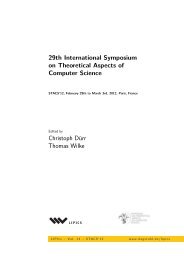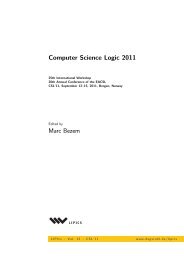Uncertainty modeling and analysis with intervals - DROPS - Schloss ...
Uncertainty modeling and analysis with intervals - DROPS - Schloss ...
Uncertainty modeling and analysis with intervals - DROPS - Schloss ...
Create successful ePaper yourself
Turn your PDF publications into a flip-book with our unique Google optimized e-Paper software.
50 11371 – <strong>Uncertainty</strong> <strong>modeling</strong> <strong>and</strong> <strong>analysis</strong> <strong>with</strong> <strong>intervals</strong>: . . .<br />
This talk is structured as follows. First, we review the DSI toolbox <strong>and</strong> its ability to<br />
h<strong>and</strong>le uncertain data in a verified way. Next, we discuss our verified implementation of<br />
MSC. MSC extend classic Markov chains by defining uncertain transition matrices <strong>and</strong> initial<br />
vectors. For example, a nuclear power plant cannot be modeled by Markov chains because<br />
of the deterministic behavior of the applied transition matrices. By utilizing MSC, we are<br />
able to describe the system’s operation time <strong>and</strong> environmental influences in terms of a<br />
nondeterministic transition matrix. Besides, the use of verified algorithms allows us to cope<br />
<strong>with</strong> the limitations of floating point arithmetic. Such algorithms provide an enclosure which<br />
is guaranteed to contain the exact result.<br />
We illustrate the functionality of our new implementation using a close-to-life example.<br />
In the next part of our contribution, we present an implementation of a C-XSC to MATLAB<br />
interface. The goal of this add-on is to make algorithms written in C-XSC accessible in<br />
DSI. To avoid conversion errors, we use the MATLAB build-in interface to access MATLAB<br />
memory directly. We discuss this implementation by considering the example of the error<br />
function. Finally, we demonstrate the ability of DSI to sample monotonic <strong>and</strong> non-monotonic<br />
functions in a verified way. In order to minimize the overestimation <strong>and</strong> the computation time,<br />
we implemented a monotonicity test using automatic differentiation provided by INTLAB [6].<br />
To compute a tight enclosure of the solution space of a function which is monotonic <strong>and</strong><br />
contains exclusively basic arithmetic operations {+, −, ∗, /} <strong>and</strong> their compositions, we<br />
utilize floating point arithmetic <strong>with</strong> directed rounding. Otherwise, we have to use interval<br />
arithmetic to get a verified enclosure of the solution. We close our talk by giving illustrative<br />
examples of sampling f(x) = x · x − x <strong>with</strong> x uniform distributed in two to three.<br />
In the course of the software presentation, we demonstrate the ability of DSI to h<strong>and</strong>le<br />
basic probability assignments (BPA) [2] in a verified way.<br />
This demonstration is split into two parts. First we show the option to define cumulative<br />
distribution functions <strong>with</strong> uncertain bounds. As an example we use the triangle<br />
distribution <strong>with</strong> the uncertain mean, the lower, <strong>and</strong> the upper bound. The second part of<br />
our demonstration deals <strong>with</strong> (non-)monotonic function propagation. We take the function<br />
f(x) = sin(x 2 ) + x 3 <strong>with</strong> x triangularly distributed <strong>and</strong> having uncertainties in the bounds<br />
<strong>and</strong> the mean. Furthermore, we illustrate the ability of DSI to detect erroneous user inputs.<br />
Finally, we demonstrate the C-XSC to MATLAB interface.<br />
References<br />
1 E. Auer, W. Luther, G. Rebner, <strong>and</strong> P. Limbourg. A Verified MATLAB Toolbox for the<br />
Dempster-Shafer Theory. In M. Arnaud, editor, Proceedings of the Workshop on the Theory<br />
of Belief Functions, Brest, April 2010. http://bfas.iutlan.univ-rennes1.fr/belief2010/html/<br />
papers/p83.pdf http://udue.de/DSI.<br />
2 S. Ferson, V. Kreinovich, L. Ginzburg, D.S. Myers, <strong>and</strong> K. Sentz. Constructing probability<br />
boxes <strong>and</strong> Dempster-Shafer structures. S<strong>and</strong> Report SAND2002-4015, S<strong>and</strong>ia National<br />
Laboratories, 2003.<br />
3 R. Hammer, M. Hocks, U. Kulisch, <strong>and</strong> D. Ratz. C++ Toolbox for Verified Computing.<br />
Springer-Verlag Berlin Heidelberg New York, 1995.<br />
4 D. Hartfiel. Markov Set-Chains. Lecture notes in mathematics; 1695. Springer, 1998. ISBN<br />
3-540-64775-9.<br />
5 P. Limbourg. Imprecise Probability Propagation Toolbox (IPP Toolbox). http://www.<br />
uni-due.de/il/ipptoolbox.php.<br />
6 S. Rump. INTLAB – INTerval LABoratory. In Tibor Csendes, editor, Developments in Reliable<br />
Computing, pages 77–104. Kluwer Academic Publishers, Dordrecht, 1999. http:<br />
//www.ti3.tu-harburg.de/rump/.



